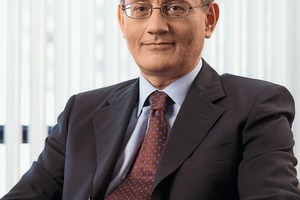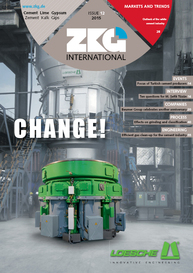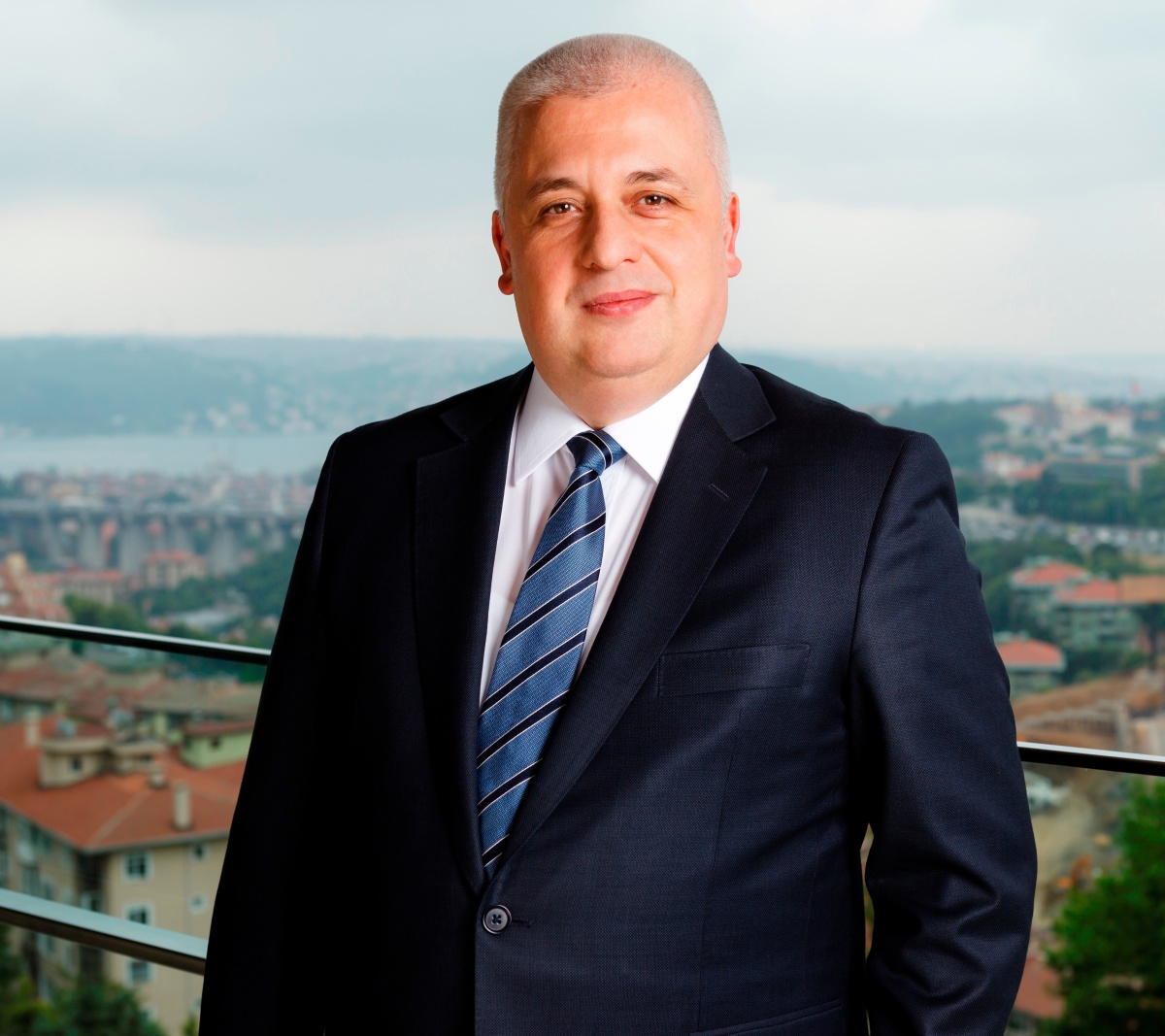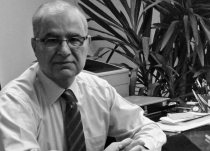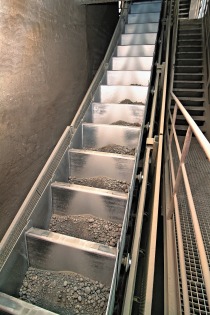Ten questions for M. Şefik Tüzün
We talked to M. Şefik Tüzün, Chairman of the Board, Turkish Cement Manufacturers’ Association, about the situation of the Turkish cement manufacturers at the 2015 TCMB conference in Antalya.
TÜZÜN: The Turkish cement market is represented by 19 players, 17 of which are organized in the Turkish Cement Manufacturers’ Association. The first five clinker capacity leading players constitute 46.5 % of the total cement capacity. Currently there are 70 cement plants in Turkey. 52 of which are integrated plants and 18 are grinding plants. These cement plants in Turkey are distributed in seven geographical regions. Within the frame of installed capacity, the Marmara and Mediterranean regions take the lead with 26.3 % and 24 % respectively. 65 of these plants are TCMA members.
TÜZÜN: The cement plants in Turkey are divided into two classes; integrated plants and cement grinding stations. The total clinker capacity of the cement plants in Turkey is 70 million t as of 2014. 11 of these cement plants could be considered as large plants (annual capacity more than 2 Mt), 20 of them as medium plants (annual capacity between 1 Mt – 2 Mt) and 21 of them could be considered as small-sized cement plants (annual capacity less than 1 Mt).
TÜZÜN: 71.2 million t of cement were produced by TCMA member plants in 2014. By adding the non-members’ estimated figures, the total cement production in Turkey reaches approximately 72.6 Mt.
2015 started with a significant decrease in volume in the Turkish cement industry. During the first quarter of 2015, cement production and demand in domestic market decreased around 25 % compared to 2014. Unfavourable weather conditions were the primary cause of this decrease in 2015 compared to mild weather of 2014. Nonetheless, the sector has recovered this loss by progressing on a monthly basis, and by the end of August, sales and exports’ decline was only by 3.3 % and 5.3 % YoY respectively. An increase of 2 % in domestic cement sales is expected by the end of 2015.
Opportunities that will lead to retain the growth over the long term include high potential residential and infrastructure projects with the growing population, increasing urbanisation, luxury goods consumption, and political stability with only one ruling party for a decade long as well as EU membership vision. The strengths of the cement industry such as proximity to the markets with export potential, sufficient amounts of raw materials, product quality, qualified labour and application of modern technologies will lead the potential growth.
TÜZÜN: Revamping of the old and inefficient process technologies has been going on since the 1990s. There has remained no wet process kiln at all in the industry since 2014. As of 2017, all plants will be operating by the dry process, most of them newly built or revamped, highly efficient plants in terms of energy use and productivity.
The technology trends can be classified into six, the last two having a lower materiality of impact in the midterm:
Reduction of power and fuel consumption: New generation high-efficiency separators, vertical mills, roller presses, higher efficiency coolers, WHR projects, cogeneration of power , higher plant sizes, frequency converters, in-line precalciners, multi-channel burners,
Reduction of maintenance expenses: for example: coolers without plates
Environment-friendly approach: Low NOx calciners, alternative fuel preparation and combustion systems and the effective use of the communication technology in process control and operation
Wind farms and various alternatives of power sourcing
Polymers and
substituting cement with silica nano-particles in concrete manufacturing.
TÜZÜN: Since 2005, there has been a tremendous increase in demand and correspondingly an increase in supply by building new capacities all over the country; this growth still continues with new projects. Very recently, two new cement plants started serving the market in 2015. One of them is in Mersin – Silifke near the Mediterranean Sea and the other one has been built (converted from a grinding unit) in Ankara. Besides these new plants, there are some ongoing projects under construction, Sivas 4500 t/d, Afyon 5000 t/d, Ankara 5000 t/d, Samsun 3500 t/d, Elazıg˘ 4000 t/d and Eskişehir 5000 t/d as clinker production capacity. There are also projections for future plants in different regions, mainly focusing on Marmara, West and South of Turkey.
TÜZÜN: EU Environmental Legislation is the assumed model in the Turkey. Turkey adapts its environmental legislation to EU in its accession period to EU membership. Therefore, EU limits are either in force or are being enforced after a transition period. This is not only limited to emissions, but also to mining activities, waste issues, water management, etc.
Nevertheless, this adaptation process is sometimes negatively influenced by unfavorable economic periods, short transition periods by legislation, high investment needs for the pre-requisite or infrastructure required for the right implementation.
The Turkish cement industry is fully aware of its responsibility on the sustainability front, and being well organized under the TCMA organization- responds to new requirements positively. Because of its positive approach, the Turkish cement industry plays the leading role in the preparation and enforcement of new legislations by the Ministry of Environment and Urbanization.
TÜZÜN: Alternative fuel substitution rate overall in Turkey is 3.71 %. This figure is very low compared to alternative fuel use in Europe. Depending on the maturity of the local waste market and industrialization, especially in the western part of the country, there are some plants which have achieved and sustaining more than 25 % substitution. 35 out of 52 plants in Turkey have the permit but do not use alternative fuel, as usage is not feasible due to scarcity of material and lack of necessary legislations.
For the Turkish cement industry to go further in AF use, maturity in the waste market needs to be developed. In order to reach this maturity, besides legislative adaptations, other industrial activities and municipalities need to be disciplined, costs to be internalized and landfills to be limited and used only for its purpose. Related ministries and the governmental bodies should take the lead for a more effective co-operation between local authorities and cement plants. From technical and manpower point of view, the Turkish cement industry does not see any barrier to further improve alternative fuel use.
TÜZÜN: Especially after devastating 1999 earthquake, handmade concrete was forbidden while old and structurally risky buildings have been defined to be reinforced or rebuilt with urban transformation projects. Therefore, the ready-mix concrete sector has become the main sales channel of the domestic cement sector with a share of 52 % in 2014. This is followed by bag dealers (34 %), the construction industry (9 %), industrial producers (2 %), and others – state industry (4 %).
Turkey is one of the leading countries in the world’s export cement market. The main market is MENA region. Approximately 65 % of the exports are dispatched to the region countries. Other important markets cover Europe (17 %) & Africa (13 %). In the coming years we assume that the share of Africa will increase while those of MENA and Europe will decline.
TÜZÜN: Products of the Turkish cement industry conform to European standards. Turkish cement market is mostly characterised by increasing bulk cement sales (79 %) over the years to reach around 85 % in 2025 creating an opportunity via upper class RMX concrete usage with full implementation of the Construction Audit Law. The market mainly demands CEMI and CEMII with market shares of 53 % and 34 % in 2014, respectively. Unlike the trend in Europe, the share of CEMI has been increasing in Turkey in recent years. Moreover, Turkey is one of the biggest white cement producers in the world. Nearly 1.3 Mt of white cement was produced in 2014. New capacity increasing announcements cover further increases in this figure.
TÜZÜN: One of the challenges for the Turkish cement industry is the excess capacity. Considering the existing clinker capacity and the current investments that will step into the sector, it is estimated that domestic cement demand could be met until 2025. The new projects are still receiving incentives from the state even under this gloomy picture for the sector.
Turkey is characterised as a cement exporting country with reasonably priced and good quality products. Turkey’s export ability will be jeopardized by various factors such as new capacities around Turkey, liberalization and opening of the Iran market to the outside world, reduced transportation cost due to much lower fuel prices, and also increasing production costs in Turkey mainly due to new legislations concerning environmental issues. The increasing pressure for environment protection will surely have impacts on the unit production costs and CAPEX through new legislation in different areas such as quarries (quarries of some mineral groups including the raw materials of the cement industry are going to be forced to move to organized mining sites) and reduced emission limits.
One of the biggest challenges with a clear environmental dimension is the promotion of the alternative fuel utilization, as not all the levers are in our hand. Disciplining waste generating sectors as responsible for their waste, involving other sectors and municipalities as solution partners, legislative adaptations and controls that will lead to cost internalization and hence eliminate unfair competition will allow the industry to reach Europe’s performance in this field.
Parallel to that, besides a customer focused market, a more sustainability focused approach is needed to satisfy further goals and overcome future challenges. The alternative fuel, alternative raw material and cementitious material utilization could be increased, which will be major levers in satisfying the currently unclear allocation for our sector in the scheme of Turkey’s Intended Nationally Determined Contribution, which is to reduce the greenhouse gas emissions by 2030 up to 21 % from Business As Usual.
As an exporting country, the potential economic turmoil and the capacity increases or demand changes in the importing countries might stand as a challenge for the Turkish cement industry resulting in excess capacity in the coastal regions which form 78 % of the total exports. Variations in export prices and potentially shrinking profit margins have a potential to take their place on the top agenda of the cement business.
Turkey has a strategic positioning between East and West leading it to become a bridge and transition country for both economy and energy resources which is becoming more specific as the centre of gravity of the world economy is moving to the east. However high country dependence on imported energy stays as a challenge coupled with power cuts and energy fluctuations bringing additional cost burdens to the industry via losses in production and failures in machinery. Reducing the import energy dependence is an important priority of the country as well as improving the working conditions of the power grid, which has a major impact also on the Turkish cement business.
As a reputable organization, TCMA is committed to develop and support a sustainable cement industry, and contribute to Turkey’s development as a growing and sustainable partner for the national growth of the Turkish Republic through:
Highly contributing to the country GDP with high capacity utilisation, high productivity and export
Effective voice of the sector by speaking in advocacy for all members
Taking proactive and responsive actions addressing industry-wide issues
Forming a foundation for stronger, knowledge-based and reliable support for all of the stakeholders
Cooperating and working together with governmental bodies and authorities for the upcoming industry-related issues
Close cooperation and partnerships with Cembureau and other cement organizations

